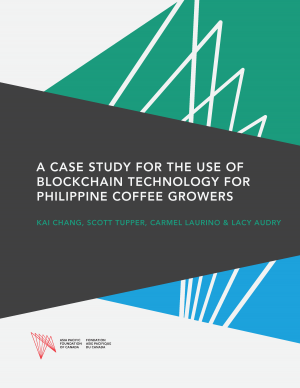Blockchain technology can create a digital record of the origin of a coffee crop and follow that batch through processing, export and roasting. The system is resistant to tampering and is visible to everyone in the chain. The niche market for high-grade, specialty coffee is lucrative and relies on buyers knowing exactly where the coffee is grown. Entering the specialty market can boost incomes of small-scale farmers who have not experienced the benefits of a spike in the global retail price of coffee in the past decade. Accurate information is an untapped driver of value for these farmers. Blockchain technology could help address three problems in the sector:
- Improving data quality and transparency;
- Increasing financial literacy for farmers; and,
- Improving access to bank loans for MSMEs.
Conducted by Kai Chang and Scott Tupper of Yave.io and Carmel Laurino and Lacy Audry of Kalsada Coffee, this research report is one of three published for the APEC-Canada Growing Business Partnership around the theme of market access, with a focus on the Philippines and other APEC economies.
